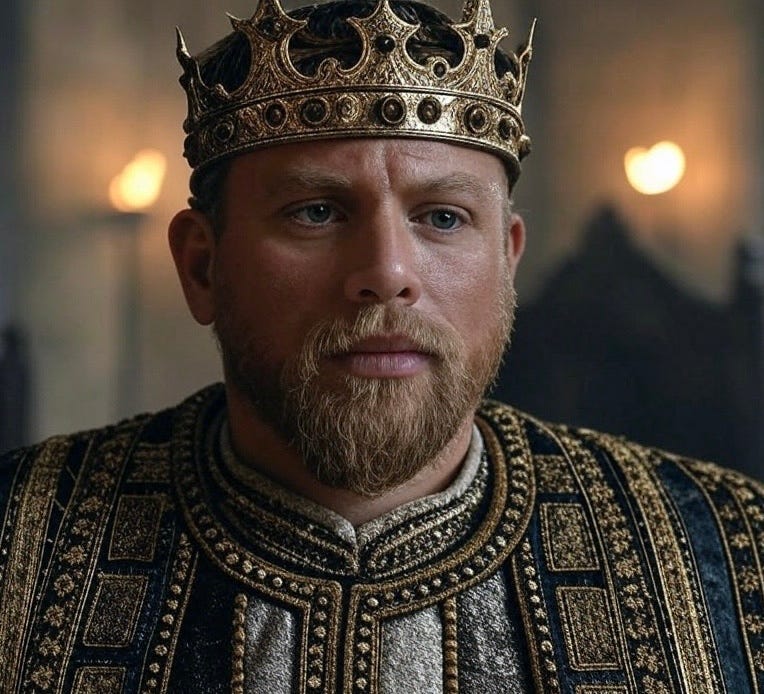In John of Wallingford’s record of Alfred’s life, he mentions the king retreated to Altheney, in Somerset. John adds that this area is also known as the ‘Land of the Nobles’. This may seem a cryptic note, but if we know the oral traditions of Briton, then we know he is talking about three key people.
The most famous Briton of the past was King Arthur, the first king of British Isles. There are many myths written about him, not just in Great Britain, but from France and as far away as Germany. There is even a story where Arthur sacks Rome.
He was likely a Romano-British noble who fought to protect his country from the ever increasing threats of invasion. He united Britain as one nation and so deserved the title of the King of the Britons.
Whether Alfred knew of Arthur is debatable.
After the rise of Anglo Saxon rule in Britain, the Romano-British were pushed towards Wales and the South-West of England. This meant the old oral traditions moved with them to Devon, Cornwall and South Wales.
Alfred was the Over-Lord of South Wales, where the stories of Arthur were kept alive as an oral tradition. So he may have been aware of him. But then as the Anglo-Saxons were the enemies in those tales, he may not have fully engaged with the stories.
If he had, I wonder how he would have been inspired by him.
My personal take on many of the Arthurian legends is how they feel like wisdom tales. What I mean, is how they present different scenarios and then fleshes out how a Christian nobleman should act. The stories seem very repetitive, as though through telling these similar tales, an iterative process is taking place. Where the author is trying to understand what the best way is to act in slightly different situations.
Many of the stories talk about how violence should be metered out. How it should only be used sparingly and never get out of hand.
We see this attitude with King Alfred. He uses killing and slaughter as a necessary evil. He controls himself and doesn’t let vengeance take him over. He seeks justice, not retribution. This is a feature of the Arthurian legends.
Another ancient person Alfred may have known about, who was part of Arthur’s story, was Merlin. He was a wizard who provided counsel to the kings, Vortigern and later Arthur.
Merlin had mystical powers, endowned upon him through demonic intervention at his conception. Though, through Christian baptism, he was freed from his demonic past and choose good over evil.
He uses these magical powers to bring about the rule of King Arthur and to protect Britain. It is said he also used his mystical ways to build Stonehenge.
If Alfred heard of Merlin, he may have looked for a similar kind of person in his life. I would propose he saw St Neot as his Merlin. St Neot not only acted as his spiritual guide, but even after his death, Alfred continued to have instructive visions from him.
Another King of the Britons which may have inspired Alfred was Brutus. According to the myths, Brutus was a descendent of the Trojan hero Aeneas. After the fall of Troy, Aeneas fled and settled in Italy. Brutus was his great-grandson.
After killing his father, Brutus was exiled and embarked on a great journey to Briton, or as known at the time, Albion. Brutus landed at Totnes in Devon and proceeds to defeat the giant Albion and his kin.
King Alfred never mentions Albion or Brutus, but he may have heard the tales. My gut feeling is this story of Brutus is a mixture of pre-Roman indigenous myths and medieval story telling. Many medieval communities linked their origin story to the fall of Troy.
This story could have inspired King Alfred, as like Brutus, he was up against the odds. But still won.
King Alfred and his biographies never mention these three people, Arthur, Merlin and Brutus. He may have been aware of the stories, but they were not intrinsic to his thinking. However, he did hide in the area where these men were prominent. Totnes for Brutus and Tintagel for Arthur and Merlin. This is what John meant by the Land of the Nobles.
For us, the stories of these three men can clearly inspire. Whether we are trying to make the right choice in a situation, choosing the correct wise counsel or realising that sometimes we need to use brute force and determination to survive our current circumstances.




